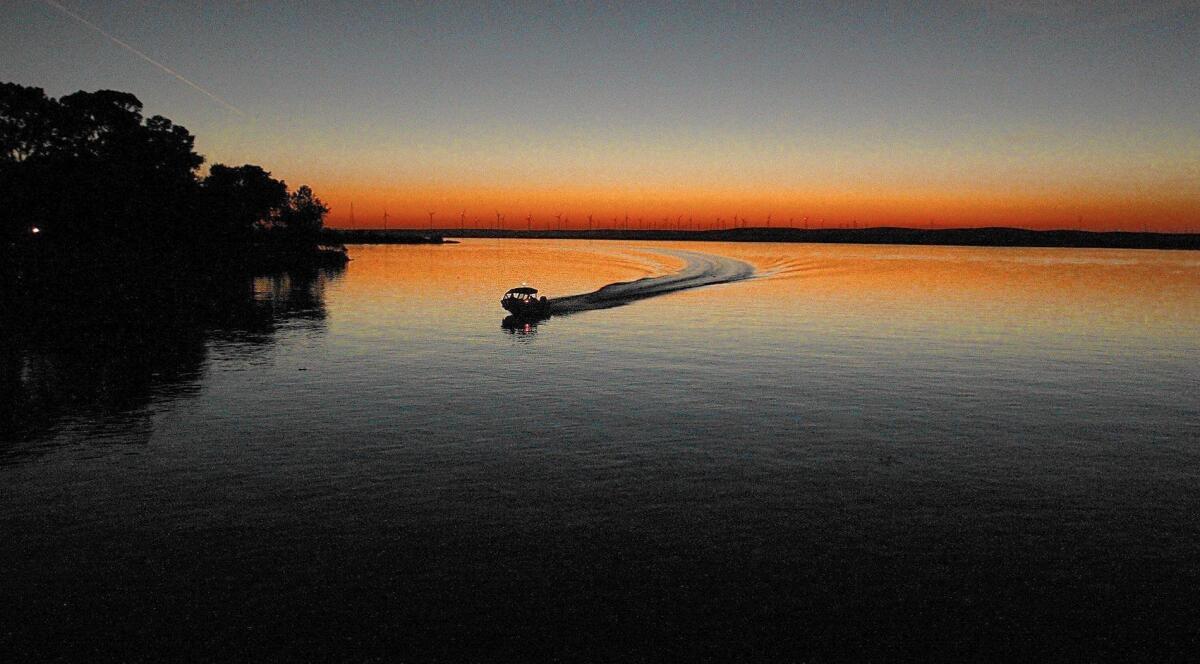Newsom hopes to broker a peace treaty in California’s water war. Some worry he’ll cave to Trump

- Share via
SACRAMENTO — Gov. Gavin Newsom may be piloting a lifeboat that will rescue the sinking California Delta. Or he may be in water over his head on a doomed mission.
The governor gets angry with skeptics who say he’s being delusional. But history sides with the doubters.
“I love reading all that, ‘Hey, he’s naive. He’s being misled,’” Newsom recently told a forum sponsored by the nonpartisan Public Policy Institute of California, his voice rising with a touch of sarcasm.
“It means we’re doing something a little different.”
No California water hole has been fought over more than the Sacramento-San Joaquin River Delta. It’s right up there with the Owens Valley and the state’s share of the Colorado River.
The delta supplies water for 27 million people and irrigates 3 million acres. California’s economy depends, in large part, on its health.
But the delta’s ecology has been declining, primarily because water from rivers has been diverted for agriculture before it reaches the West Coast’s largest estuary. And the water that does make it there has been overpumped through fish-chomping monstrosities into southbound aqueducts.
This has devastated native fish — salmon, steelhead, smelt — and prompted courts to occasionally tighten the spigots on water pumped to San Joaquin Valley farms and Southern California cities.
To succeed in fixing the delta, Newsom must navigate through eternally warring interests: San Joaquin Valley agriculture and the Metropolitan Water District of Southern California on one side, and delta farmers, the coastal fishing industry and environmentalists on the other.
Making the current dispute even more intense, the president and the governor now are in a spat over water for the first time in modern history. Newsom got dragged in reluctantly.
“I don’t need to be told, ‘You need to be tough against the Trump administration,’” Newsom said at the PPIC forum. “Give me a break. I know that.”
Newsom’s delta rescue plan basically involves everyone getting along, compromising and singing “Kumbaya.” But that normally hasn’t worked in the past.
Water wars are second nature in the West. California has been fighting over water since statehood.
In 2009, Gov. Arnold Schwarzenegger muscled a ballyhooed bill through the Legislature that was heralded as a wonderwork. It was supposed to restore the delta and stabilize water deliveries. So far, it has belly-flopped.
It led to Gov. Jerry Brown proposing construction of two monster tunnels to siphon fresh Sacramento River water from the north delta directly into the southbound aqueducts, reducing use of the fish-killing pumps. But delta communities and environmentalists loudly protested the loss of fresh water. And the project’s $17-billion cost was too much for many water districts anyway.
So Newsom scaled back the proposal to one tunnel, which is still being planned. Nothing about it is certain.
Newsom “seems to be chasing this white whale of voluntary agreements,” says Doug Obegi, senior attorney for the Natural Resources Defense Council.
“It feels like the state is trying to adapt more to Trump [environmental protection] rollbacks rather than forcing the Trump administration to adjust to California values.”
The Newsom administration denies it’s leaning toward Trump’s views.
Newsom has pulled the warring interests — mainly San Joaquin Valley irrigators, the Metropolitan Water District and environmentalists — into efforts to reach voluntary agreements on river flows, delta pumping and habitat improvements.
Newsom is so committed to the negotiations that in September he vetoed state Senate leader Toni Atkins’ anti-Trump environmental protection bill, SB 1. Under the measure, if Trump weakened federal environmental protections, they’d automatically be adopted by California. But water districts threatened to walk out of talks with Newsom if he signed the legislation. So he didn’t.
“I’m trying to put together a peace plan in the delta,” says Wade Crowfoot, Newsom’s secretary of the Natural Resources Agency.
“I don’t want to be a Pollyanna, but there’s beginning to be a sea change in many of these water users. They’re just tired of fighting.”
But why would agriculture interests compromise with Newsom, at least until they learn whether Trump can win reelection in November? His interior secretary is one of their own: former Westlands Water District lobbyist David Bernhardt.
Because, Crowfoot says, the state still can set environmental protection regulations that govern both the federal Central Valley and state water projects.
But environmentalists fear that Newsom will cave in to Trump and valley growers and offer a deal too good for them to reject.
Last November, the Trump administration announced plans to roll back endangered species protections and export more delta water to Central Valley Project customers. The state threatened to sue but never did — despite loud pressure from environmentalists — until last week. That’s when Trump flew to California and flamboyantly signed an order implementing the plan.
Newsom sued, but expressed hope that the state, the feds and the warring parties could compromise. Then he’d drop the suit.
“You want to get into lawsuits? You want to screw this person, screw that person, spending seven years getting nothing done?” Newsom asserted testily at the Jan. 29 PPIC forum. “I’m the wrong person in this job. That’s so easy.…
“The world is changing. We have to change with it.… Putting the old binaries aside, getting off our high horse. Recognizing that we need each other.”
If Newsom can pull this off, it would truly be a remarkable achievement. But can irrigators and environmentalists fit in the same lifeboat? They never have.
More to Read
Sign up for Essential California
The most important California stories and recommendations in your inbox every morning.
You may occasionally receive promotional content from the Los Angeles Times.














